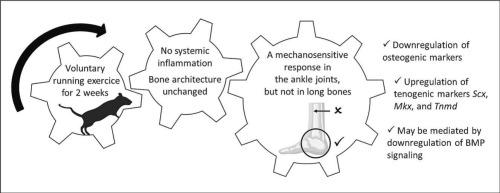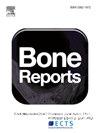小鼠的自主运动会引发踝关节的抗骨质生成和促韧反应,但不会影响长骨
IF 2.6
Q3 ENDOCRINOLOGY & METABOLISM
引用次数: 0
摘要
生物机械刺激被认为在关节稳态中占据着核心地位,但运动的确切贡献仍然难以捉摸。我们的目的是在体内描述机械刺激对健康小鼠在轻微运动时脚踝骨化的细胞控制调节的影响。我们对 DBA/1 雄性小鼠进行了为期两周的自愿跑步锻炼,并与标准条件下饲养的小鼠进行了比较(每组 20 只)。小鼠每天以 14.5 ± 0.5 米/分钟的速度自由使用活动轮,跑动距离为 5.5 ± 0.8 公里。测量了血清中碱性磷酸酶、IL-6、IL-8/Kc、IL-17a 和 TNF-α 的水平。未检测到全身炎症的变化。μCT和跟腱内膜组织学检查显示,股骨和小腿骨的骨结构没有变化。长骨中机械敏感基因 Sclerostin(Sost)和 Periostin(Postn)的表达不受运动影响。相反,关节中的 Sost 和 Postn 水平受运动影响,而成骨标志物(Col10a1、Runx2、Osx 和 Dmp1)在运动组中下调。此外,运动还上调了韧带生成标志物 Scx、Mkx 和 Tnmd。因此,自主运动会影响关节细胞的表型,但不会影响长骨。由于这些细胞中Bmp2、Bmp4和Id1的基因表达也减少了,BMP信号的非调控可能是造成其机械敏感性反应的部分原因。跑步运动似乎能保护肌腱,使其免于逐渐骨化,这在许多骨关节病中都能看到。这项研究为今后在各种小鼠模型中研究机械刺激的影响铺平了道路。本文章由计算机程序翻译,如有差异,请以英文原文为准。

Voluntary exercise in mice triggers an anti-osteogenic and pro-tenogenic response in the ankle joint without affecting long bones
Biomechanical stimulation is proposed to occupy a central place in joint homeostasis, but the precise contribution of exercise remains elusive. We aimed to characterize in vivo the impact of mechanical stimulation on the cell-controlled regulation of ossification within the ankles of healthy mice undergoing mild physical activity. DBA/1 male mice were subjected to voluntary running exercise for two weeks, and compared to mice housed in standard conditions (n = 20 per group). Free access to activity wheels resulted in a running exercise of 5.5 ± 0.8 km/day at 14.5 ± 0.5 m/min. Serum levels of alkaline phosphatase, IL-6, IL-8/Kc, IL-17a, and TNF-α were measured. No change in systemic inflammation was detected. The bone architecture of the femur and the calcaneus was unchanged, as revealed by μCT and histology of the enthesis of the Achilles tendon. mRNAs were extracted from femurs, tibias, and ankle joints before RT-qPCR analysis. The expression of the mechanosensitive genes Sclerostin (Sost) and Periostin (Postn) was not impacted by the exercise in long bones. Oppositely, Sost and Postn levels were modulated by exercise in joints, and osteogenic markers (Col10a1, Runx2, Osx, and Dmp1) were downregulated in the exercise group. In addition, the tenogenic markers Scx, Mkx, and Tnmd were upregulated by exercise. Thus, voluntary exercise affected the phenotype of joint cells without impacting long bones. As gene expression of Bmp2, Bmp4, and Id1 was also reduced in these cells, an off-regulation of BMP signaling could be partly responsible for their mechanosensitive response. Running exercise seemed to preserve the tendon from its progressive ossification, as seen in numerous enthesopathies. This study paves the way to future experiments for investigating the effects of mechanical stimulation in various mouse models.
求助全文
通过发布文献求助,成功后即可免费获取论文全文。
去求助
来源期刊

Bone Reports
Medicine-Orthopedics and Sports Medicine
CiteScore
4.30
自引率
4.00%
发文量
444
审稿时长
57 days
期刊介绍:
Bone Reports is an interdisciplinary forum for the rapid publication of Original Research Articles and Case Reports across basic, translational and clinical aspects of bone and mineral metabolism. The journal publishes papers that are scientifically sound, with the peer review process focused principally on verifying sound methodologies, and correct data analysis and interpretation. We welcome studies either replicating or failing to replicate a previous study, and null findings. We fulfil a critical and current need to enhance research by publishing reproducibility studies and null findings.
 求助内容:
求助内容: 应助结果提醒方式:
应助结果提醒方式:


